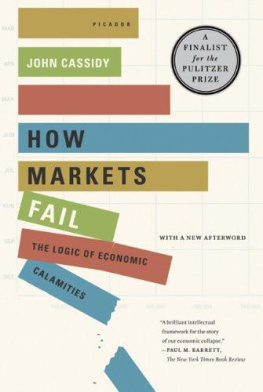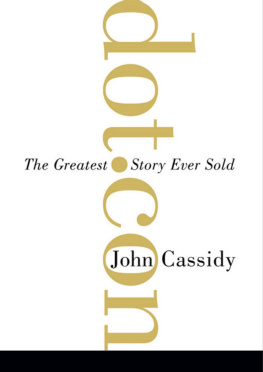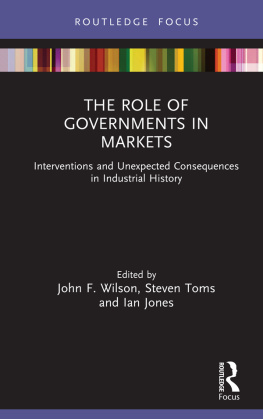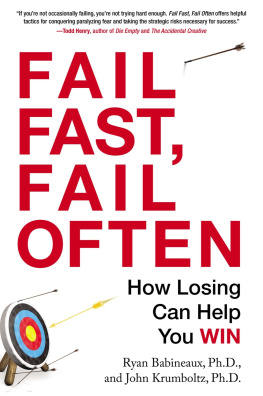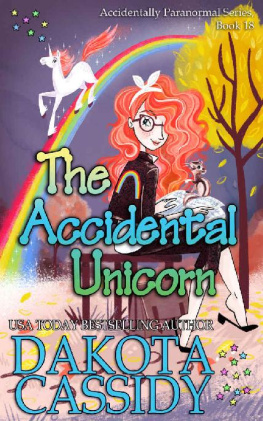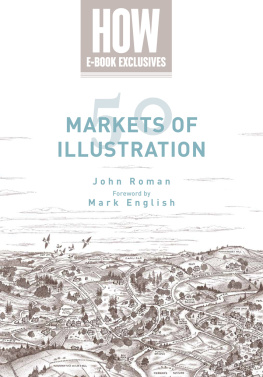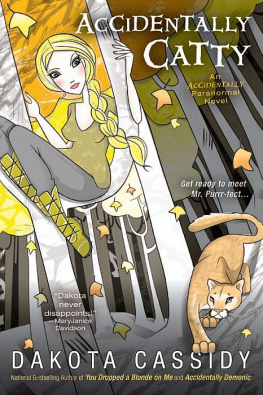John Cassidy - How Markets Fail: The Logic of Economic Calamities
Here you can read online John Cassidy - How Markets Fail: The Logic of Economic Calamities full text of the book (entire story) in english for free. Download pdf and epub, get meaning, cover and reviews about this ebook. year: 2010, publisher: Penguin Books Ltd, genre: Politics. Description of the work, (preface) as well as reviews are available. Best literature library LitArk.com created for fans of good reading and offers a wide selection of genres:
Romance novel
Science fiction
Adventure
Detective
Science
History
Home and family
Prose
Art
Politics
Computer
Non-fiction
Religion
Business
Children
Humor
Choose a favorite category and find really read worthwhile books. Enjoy immersion in the world of imagination, feel the emotions of the characters or learn something new for yourself, make an fascinating discovery.
- Book:How Markets Fail: The Logic of Economic Calamities
- Author:
- Publisher:Penguin Books Ltd
- Genre:
- Year:2010
- Rating:3 / 5
- Favourites:Add to favourites
- Your mark:
- 60
- 1
- 2
- 3
- 4
- 5
How Markets Fail: The Logic of Economic Calamities: summary, description and annotation
We offer to read an annotation, description, summary or preface (depends on what the author of the book "How Markets Fail: The Logic of Economic Calamities" wrote himself). If you haven't found the necessary information about the book — write in the comments, we will try to find it.
John Cassidy: author's other books
Who wrote How Markets Fail: The Logic of Economic Calamities? Find out the surname, the name of the author of the book and a list of all author's works by series.
How Markets Fail: The Logic of Economic Calamities — read online for free the complete book (whole text) full work
Below is the text of the book, divided by pages. System saving the place of the last page read, allows you to conveniently read the book "How Markets Fail: The Logic of Economic Calamities" online for free, without having to search again every time where you left off. Put a bookmark, and you can go to the page where you finished reading at any time.
Font size:
Interval:
Bookmark:
THE LOGIC OF
ECONOMIC CALAMITIES
JOHN CASSIDY
FARRAR, STRAUS AND GIROUX NEW YORK
To Lucinda, Beatrice, and Cornelia
CONTENTSI am shocked, shocked, to find that gambling is going on in here!
Claude Rains as Captain Renault in Casablanca
The old man looked drawn and gray. During the almost two decades he had spent overseeing Americas financial system, as chairman of the Federal Reserve, congressmen, cabinet ministers, even presidents had treated him with a deference that bordered on the obsequious. But on this morningOctober 23, 2008Alan Greenspan, who retired from the Fed in January 2006, was back on Capitol Hill under very different circumstances. Since the market for subprime mortgage securities collapsed, in the summer of 2007, leaving many financial institutions saddled with tens of billions of dollars worth of assets that couldnt be sold at any price, the Democratic congressman Henry Waxman, chairman of the House Committee on Oversight and Government Reform, had held a series of televised hearings, summoning before him Wall Street CEOs, mortgage industry executives, heads of rating agencies, and regulators. Now it was Greenspans turn at the witness table.
Waxman and many other Americans were looking for somebody to blame. For more than a month following the sudden unraveling of Lehman Brothers, a Wall Street investment bank with substantial holdings of mortgage securities, an unprecedented panic had been roiling the financial markets. Faced with the imminent collapse of American International Group, the largest insurance company in the United States, Ben Bernanke, Greenspans mild-mannered successor at the Fed, had approved an emergency loan of $85 billion to the company. Federal regulators had seized Washington Mutual, a major mortgage lender, selling off most of its assets to JPMorgan Chase. Wells Fargo, the nations sixth-biggest bank, had rescued Wachovia, the fourth-biggest. Rumors had circulated about the soundness of other financial institutions, including Citigroup, Morgan Stanley, and even the mighty Goldman Sachs.
Watching this unfold, Americans had clung to their wallets. Sales of autos, furniture, clothes, even books had collapsed, sending the economy into a tailspin. In an effort to restore stability to the financial system, Bernanke and the Treasury secretary, Hank Paulson, had obtained from Congress the authority to spend up to $700 billion in taxpayers money on a bank bailout. Their original plan had been to buy distressed mortgage securities from banks, but in mid-October, with the financial panic intensifying, they had changed course and opted to invest up to $250 billion directly in bank equity. This decision had calmed the markets somewhat, but the pace of events had been so frantic that few had stopped to consider what it meant: the Bush administration, after eight years of preaching the virtues of free markets, tax cuts, and small government, had turned the U.S. Treasury into part owner and the effective guarantor of every big bank in the country. Struggling to contain the crisis, it had stumbled into the most sweeping extension of state intervention in the economy since the 1930s. (Other governments, including those of Britain, Ireland, and France, had taken similar measures.)
Dr. Greenspan, Waxman said. You were the longest-serving chairman of the Federal Reserve in history, and during this period of time you were, perhaps, the leading proponent of deregulation of our financial markets... You have been a staunch advocate for letting markets regulate themselves. Let me give you a few of your past statements. Waxman read from his notes: Theres nothing involved in federal regulation which makes it superior to market regulation. There appears to be no need for government regulation of off-exchange derivative transactions. We do not believe a public policy case exists to justify this government intervention. Greenspan, dressed, as always, in a dark suit and tie, listened quietly. His face was deeply lined. His chin sagged. He looked all of his eighty-two years. When Waxman had finished reading out Greenspans words, he turned to him and said: My question for you is simple: Were you wrong?
Partially, Greenspan replied. He went on: I made a mistake in presuming that the self-interests of organizations, specifically banks and others, were such that they were best capable of protecting their own shareholders and their equity in the firms... The problem here is something which looked to be a very solid edifice, and, indeed, a critical pillar to market competition and free markets, did break down. And I think that, as I said, shocked me. I still do not fully understand why it happened and, obviously, to the extent that I figure out what happened and why, I will change my views.
Waxman, whose populist leanings belie the fact that he represents some of the wealthiest precincts in the countryBeverly Hills, Bel Air, Malibuasked Greenspan whether he felt any personal responsibility for what had happened. Greenspan didnt reply directly. Waxman returned to his notes and started reading again. I do have an ideology. My judgment is that free, competitive markets are by far the unrivaled way to organize economies. We have tried regulations. None meaningfully worked. Waxman looked at Greenspan. That was your quote, he said. You had the authority to prevent irresponsible lending practices that led to the subprime mortgage crisis. You were advised to do so by many others. Now our whole economy is paying the price. Do you feel that your ideology pushed you to make decisions that you wish you had not made?
Greenspan stared through his thick spectacles. Behind his mournful gaze lurked a savvy, self-made New Yorker. He grew up during the Great Depression in Washington Heights, a working-class neighborhood in upper Manhattan. After graduating from high school, he played saxophone in a Times Square swing band, and then turned to the study of economics, which was coming to be dominated by the ideas of John Maynard Keynes. After initially embracing Keyness suggestion that the government should actively manage the economy, Greenspan turned strongly against it. In the 1950s, he became a friend and acolyte of Ayn Rand, the libertarian philosopher and novelist, who referred to him as the undertaker. (In his youth, too, he was lugubrious.) He became a successful economic consultant, advising many big corporations, including Alcoa, J.P. Morgan, and U.S. Steel. In 1968, he advised Richard Nixon during his successful run for the presidency, and under Gerald Ford he acted as chairman of the White House Council of Economic Advisers. In 1987, he returned to Washington, this time permanently, to head the Fed and personify the triumph of free market economics.
Now Greenspan was on the defensive. An ideology is just a conceptual framework for dealing with reality, he said to Waxman. To exist, you need an ideology. The question is whether it is accurate or not. What I am saying to you is, yes, I found a flaw. I dont know how significant or permanent it is, but I have been very distressed by that fact. Waxman interrupted him. You found a flaw? he demanded. Greenspan nodded. I found a flaw in the model that I perceived as the critical functioning structure that defines how the world works, so to speak, he said.
Waxman had elicited enough already to provide headlines for the following days newspapersthe Financial Times: I made a mistake, admits Greenspanbut he wasnt finished. In other words, you found that your view of the world, your ideology, was not right, he said. It was not working?
Precisely, Greenspan replied. Thats precisely the reason I was shocked. Because I had been going for forty years, or more, with very considerable evidence that it was working exceptionally well.
Font size:
Interval:
Bookmark:
Similar books «How Markets Fail: The Logic of Economic Calamities»
Look at similar books to How Markets Fail: The Logic of Economic Calamities. We have selected literature similar in name and meaning in the hope of providing readers with more options to find new, interesting, not yet read works.
Discussion, reviews of the book How Markets Fail: The Logic of Economic Calamities and just readers' own opinions. Leave your comments, write what you think about the work, its meaning or the main characters. Specify what exactly you liked and what you didn't like, and why you think so.

